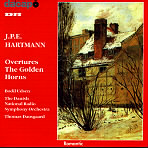Let’s get the downside over with first. The Golden Horns is a melodrama: in other words, speech over music. The poem, in Danish, is one of those creaky ballads about bards and funeral mounds and ravens flying about–Denmark’s past glory, doom and destiny–that sort of thing. It’s only 11 minutes long, but it’s a long 11 minutes! No matter. The remainder of the disc includes four very fine overtures by a composer with a conservative idiom but good theatrical instincts. These allow Hartmann some very characterful writing for winds and brass, and prevent him from lapsing into the sort of wan, Mendelssohnian noodling that makes so much of the music of his contemporary, Niels Gade, so boring. In fact, a distinctly Danish style clearly emerges in Hartmann’s work, especially evident in Hakon Jarl and the late (1881) overture to Yrsa. He hasn’t quite the individual touch of, say, Berwald, but he’s getting there. Fans of Scandinavian music will find him interesting and appealing. Performances are fine, even of The Golden Horns, though you may feel, as I said, that once through is enough. Fortunately the rest of the disc is delightfully repeatable.
































